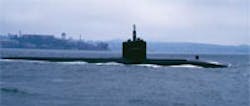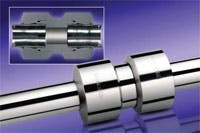Fluid connector wins UK Defence Standard approval
Fluid connector tested to UK Defense Standard
When you need to permanently join high-pressure hydraulic lines subjected to pressure spikes, your only choice usually has been brazing or welding. Welded tube fittings are often used where pressures exceed ratings of ferrule types — generally greater than 6000 psi (413 bar). Welded fittings are also used in lower pressure applications when designers want the peace of mind that comes from a welded connection, or where a leak could have serious consequences.
However, Parker Instrumentation, Barnstaple, U.K., offers Phastite connectors as a convenient and cost-effective alternative to labor-intensive brazed and welded joints. An indication of their integrity became evident when Parker Instrumentation successfully tested its Phastite connectors for permanent high-pressure fluid connections against a major UK Defense Standard. This qualification allows the connectors to be specified for surface and submarine vessel pipework applications.
Getting in phase
Phastite connectors assemble in seconds by means of a push-fit operation, saving considerable installation time compared to the welded connections traditionally used in this application. The connectors have been tested by QinetiQ, an international defense and security technology business experienced in shock testing in the UK to NES 797 Part 5, which covers highpressure fluid connectors.
Among the specifications are tests of a high-pressure fluid system’s resistance to extreme shock conditions of up to 200 G (1961 m/sec2), and with displacement of piping assemblies by 63 mm (2.4 in.). Parker also tested the fittings to a much higher shock rating of 500 G (4903 m/sec2) to demonstrate the connector’s integrity, and to anticipate an evolution of the standard currently in progress.
Marine applications formed much of the development requirements for the Phastite tube connectors. Large vessels can require thousands of tube runs with several fittings each; these are often welded and installed in-place— even if tubing has to be forced away from walls in order to weld the fitting.
If non-destructive testing is required — as is often the case with naval vessels — it adds considerable cost to an already lengthy installation. Phastite allows such tubing joints to be assembled in place without moving the tubing, and in only a few seconds. No testing is required apart from the normal system pressure test following assembly.
Additional testing
As part of Parker’s own development tests for Phastite, a tube run was deformed under pressure to five times NES 797 requirements without leakage. The tube run was then subjected to increasing pressure until destruction, with the tubing itself bursting at 2200 bar (31,908 psi). However, the Phastite joint held.
The Phastite fitting’s design relies on cavities that accept deformation of tubing under the action of multiple gripping profiles — providing a strong joint that is leak tight and prevents tubing blowing out under pressure.
Phastite fittings are supplied as onepiece components. To make a joint, all that’s required is to insert the tube, and then push the collar along the fitting body until it reaches a dead stop. This operation is performed by a simple handheld hydraulic tool, and takes a few seconds. The tool ensures users of right-first-time connections. This approach contrasts with the requirement to perform a 360° weld around the circumference of a tube, an operation requiring skill, consumables, expensive equipment, and up to 10 minutes of time, plus the time for inspection.
This report was provided by Parker Instrumentation, Barnstaple, UK. For more information, call 44 (0)1271 313131 or e-mail [email protected]. In the US, contact Parker Instrumentation, Huntsville, Alabama, at (256) 881-2040 or [email protected].



